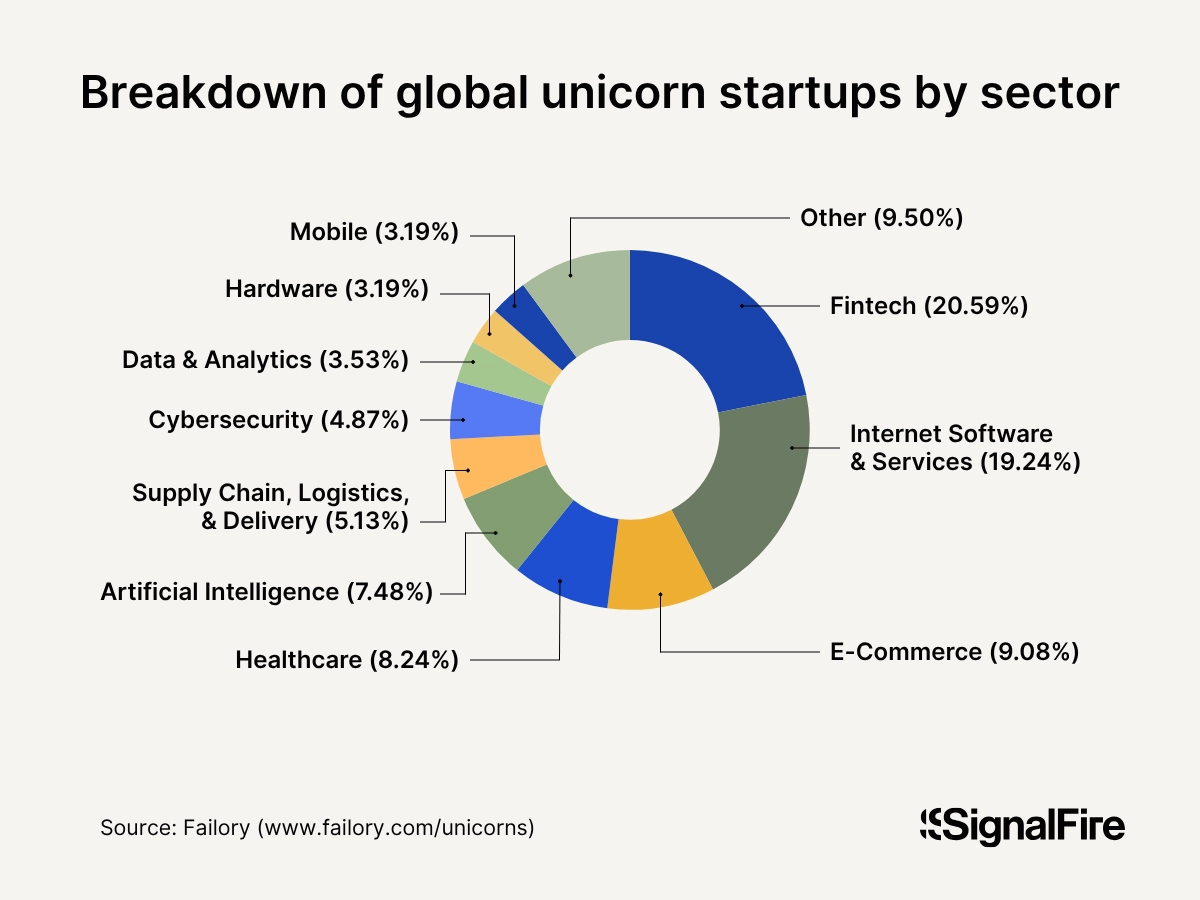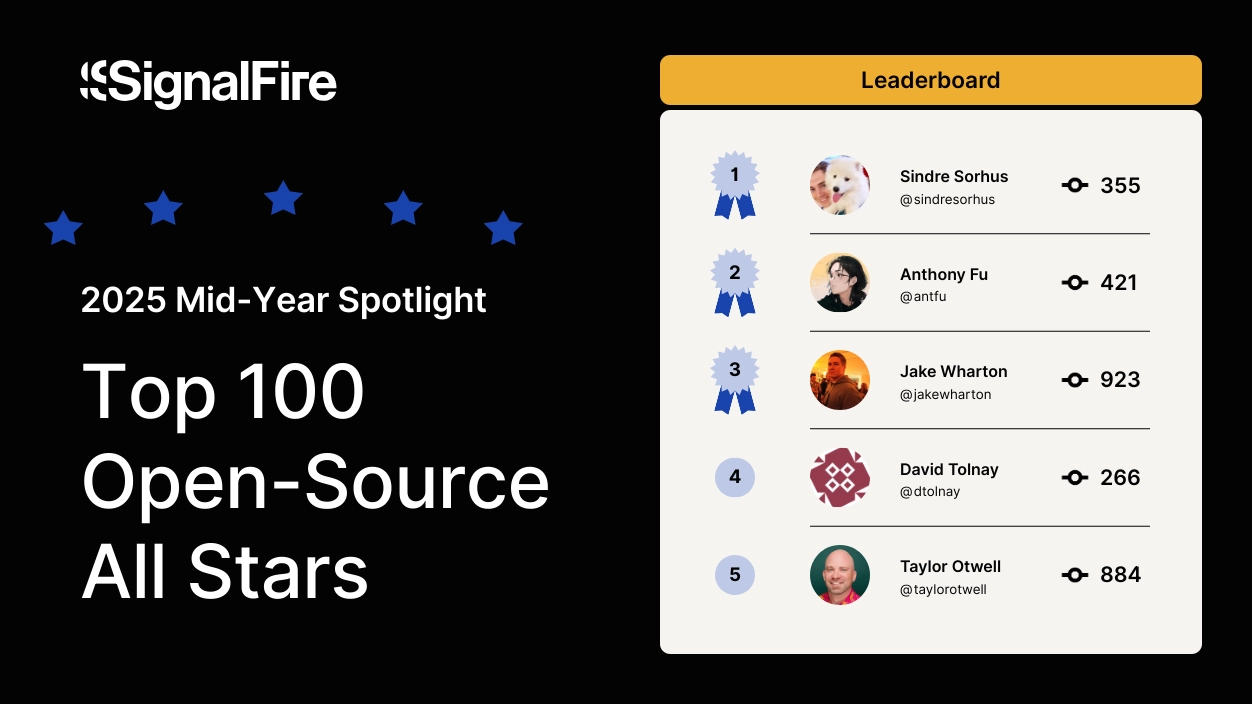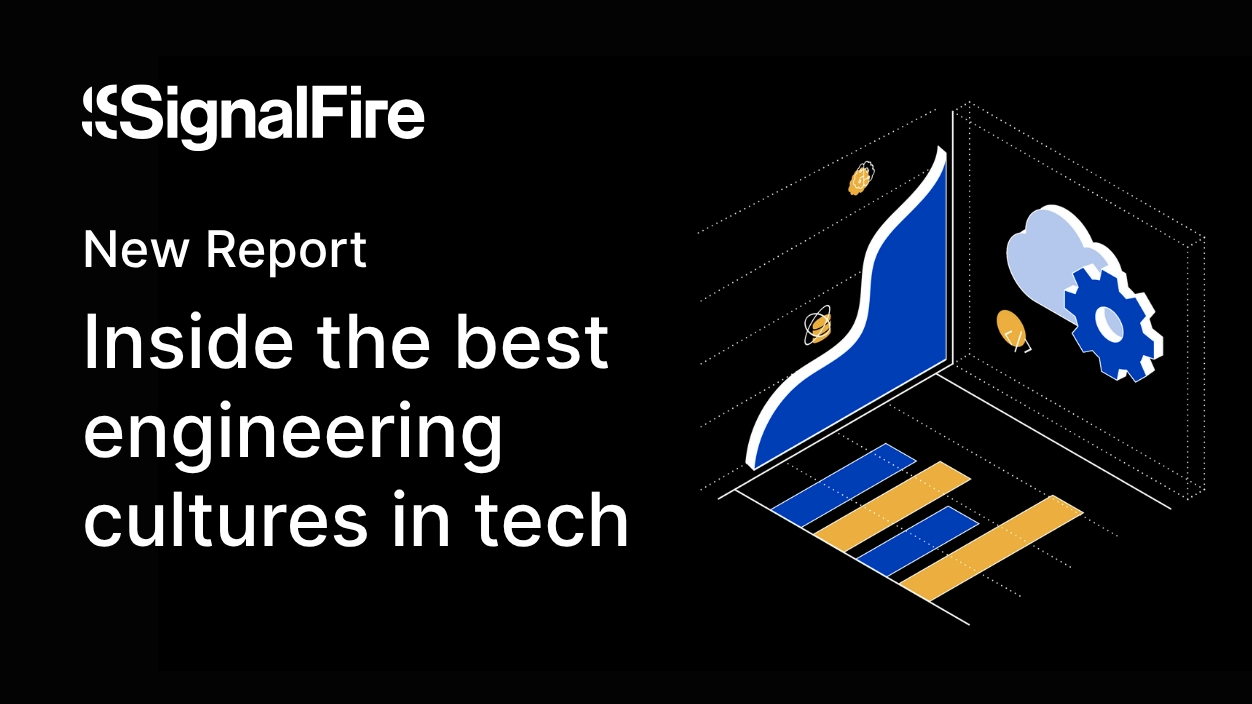
The healthcare sector has long lagged in unicorn creation—just 8% of all billion-dollar startups despite being the U.S.’s largest sector both by employment and revenue. But that’s changing fast. AI-native healthcare startups are scaling in record time, and the founders behind them look very different from the last generation.
SignalFire’s healthcare investment and data science teams used Beacon—our AI platform that tracks over 650 million professionals and 80 million companies—to analyze 300+ HealthTech unicorn founders behind these billion-dollar companies. This report reveals the new blueprint: where they come from, their career paths, how they build, and why they’re winning.
1. The rise of Health & PharmaTech unicorns
Unicorns are hard to build. HealthTech unicorns are even harder, slowed for years by complex regulation, tech adoption barriers, and fragmented buyers. But that’s changing quickly. For the first time, there’s a convergence of tailwinds: HealthTech has the talent, tech, and timing on its side.
When Cowboy Ventures founder Aileen Lee coined the term “unicorn” in a 2013 TechCrunch blog post, only 39 of the past decade's VC-backed startups had crossed the $1 billion valuation. Today, there are over 1,000 unicorns worldwide. Yet, healthcare makes up just 8% of all unicorns, despite being a $5 trillion market that drives nearly 20% of U.S. GDP. It’s not for lack of market size—it’s because HealthTech is late to the party.

2. From policy to platform: Why healthcare is finally ready for AI at scale
Structural complexity, slow sales cycles, fragmented stakeholders, and strict regulations made it nearly impossible for healthcare startups to move fast or scale efficiently. In a system built for caution over iteration, tech founders often stayed away, and incumbents stayed entrenched. Until now.
Healthcare is leapfrogging. Just as some emerging markets skipped landlines and went straight to mobile, we believe healthcare is about to jump into an AI-powered future.
It’s because two unstoppable forces are converging:
- Breakthroughs in AI (LLMs, auto-tuning agents, foundation models)
- Digitized healthcare data that's finally structured and exchangeable at scale
This inflection point wouldn’t exist without the foundational work of the HITECH Act and 21st Century Cures Act, which paved the way for digitizing healthcare data and making it machine-readable fuel for AI.
The timing of this shift couldn’t be more critical, as the industry faces:
- A massive labor shortage that’s straining care delivery
- Administrative bloat that is crushing operating margins
- An explosion of healthcare data: 100+ zettabytes generated per year—too much for humans alone to handle
Against this backdrop, we believe a new wave of Health and PharmaTech AI unicorns is emerging, ready to transform the U.S. healthcare market. The next decade will be a golden era for new unicorns at the intersection of health and AI.
3. Health & PharmaTech exit strategies are evolving: IPOs are cold, M&A is hot
The traditional HealthTech IPO playbook is showing cracks. Since 2000, 85 HealthTech unicorns have exited via IPO or SPAC. We’ve listed the top 25 publicly-traded companies that exited via IPO, by market cap, as of February 2025. Of those, only 6 are still trading publicly today. The rest?
- 10 of these companies (including Babylon and Pear Therapeutics) have been delisted.
- 14 of these companies have been taken private, with major deals like Towerbrook’s $8.9 billion buyout of R1 RCM, and CVS Health’s $8 billion acquisition of Signify Health.

Public market volatility has chilled IPO pipelines despite high-profile moves like Tempus AI’s $6B IPO and S-1s filed by Hinge Health and Omada. Founders are looking elsewhere for exits.
M&A has stepped in as the dominant exit path:
As IPOs have stalled and strategic buyers are stepping up, M&A is now the dominant exit path. Billion-dollar deals are reshaping the market and signaling demand for scalable platforms, data infrastructure, and value-based care.
- 60+ HealthTech M&A deals have surpassed $100 million
- 25+ unicorns have exited via strategic acquisition
- Buyers like CVS, UnitedHealth, and PE firms are reshaping the landscape

IPOs may be paused, but demand for scalable HealthTech platforms is strong. Founders are building targeted solutions that fill critical gaps for large buyers. Accordingly, this wave of consolidation isn’t just changing ownership structures—it’s also shifting where the next unicorns are built.
4. Where the builders are: Health & PharmaTech's new power centers
Healthcare innovation used to cluster around legacy strongholds like Boston and San Diego, but our data shows a clear geographic rebalancing. Founders are increasingly choosing cities with better access to machine learning talent, startup capital, and engineering culture over proximity to hospitals or research institutions.
- San Francisco leads with 5x more HealthTech unicorn founders than Boston.
- New York City isn’t far behind, boasting 3x more founders than Boston.
- Boston still punches above its weight, with 50% more founders than Los Angeles—but its dominance has clearly diminished.
Meanwhile, new HealthTech hubs are rising:
- Miami is drawing digital health and value-based care innovators with its regulatory flexibility and capital influx.
- Salt Lake City is emerging as a hub for biotech and digital health, thanks to strong talent pipelines and more affordable hiring.
- Washington, D.C., is emerging as a key hub for policy-aware startups that want proximity to the FDA, NIH, and CMS.
Seattle, Chicago, and LA are also heating up—blending enterprise health expertise with tech ecosystems.

The talent shift is also generational. Founders are as fluent in Python as they are in HIPAA, and they want to build in cities that reflect that hybrid DNA.
The real shakeup isn’t just geographic—it’s also about who is building. Today’s HealthTech unicorns aren’t led by only MDs and PhDs, but by operators, technologists, and cross-industry builders rewriting the traditional playbook.
5. Who’s building these unicorns: The new founder archetype
We used Beacon, our proprietary AI platform that tracks over 650 million professionals and 80 million organizations, to analyze the profiles of 300+ HealthTech unicorn founders. Here's what we found:
HealthTech unicorn founders are seasoned operators
The path to $1 billion in healthcare rarely starts in a dorm room. This industry bets on experienced leaders with operational know-how, stakeholder trust, and long-term relationships.
- 70% had 10+ years of experience before founding
- 23% had 20+ years under their belt—seasoned pros, not rookies

Outsiders breaking In: The career DNA of HealthTech unicorn founders
More than half of these founders (54.5%) are healthcare insiders—veterans of clinical settings, healthcare IT, biopharma, medtech, or payer-provider systems. They know the pain points firsthand and build with domain depth.
Experience alone isn’t the new edge. Execution is. In fact, 45.5% had no healthcare background before founding, bringing fresh playbooks from SaaS, fintech, and enterprise software into a sector overdue for disruption.

The strongest founding teams today combine tech-native talent with healthcare insiders who know how to navigate the slow, messy complexity of the U.S. healthcare system.
More HealthTech unicorns are built by first-time founders than veterans
You’d expect billion-dollar HealthTech startups to be built by serial founders, but 58.5% were actually first-time founders. Only 41% had prior founder experience. Fresh eyes are winning by pairing deep domain expertise with relentless execution, or surrounding themselves with operators and advisors who fill in the gaps

Founding teams over solo heroes
The lone genius myth doesn’t hold in healthcare—over 80% of HealthTech unicorns were built by founding teams, not solo acts. With complex challenges across clinical, technical, and GTM fronts, it takes founding teams with complementary skill sets to move fast, build trust, and survive. The result? Faster decision-making, stronger investor confidence, and a higher chance of survival.

Advanced degrees give HealthTech unicorn founders an edge
In healthcare, academic firepower matters. Over half (55%) of HealthTech unicorn founders hold advanced degrees (master's, PhD, or professional degrees), and just 5% stopped at high school or an associate’s program. This tilt reflects the unique demands of the space. They're building in high-stakes terrain—touching patients, navigating the FDA, and selling into hospitals—where deep expertise builds trust.

There’s nuance behind the numbers. Many new HealthTech founders combine traditional education with unconventional career paths. For example:
- Some PhD founders pivoted from academia to startup operating roles, then started new companies
- A few CEOs worked in biopharma or medtech before crossing into AI-driven startups, bringing a strong understanding of GTM and compliance challenges.
Builders, not sellers: The functional edge of HealthTech founders
HealthTech unicorns are being built by builders, not sellers. A third of these founders came from engineering. Only 15% came from product and 7% from sales backgrounds. In this space, founders lean on clinical or technical credibility first—then bring in GTM talent later.

The new winning combo? Deep domain knowledge + an operator mindset.
6. Centaur Teams: Hyperscaling in Health & PharmaTech
The term “Centaur Teams” originally comes from chess, where the strongest players weren’t humans or machines, but both working together. After losing to IBM’s Deep Blue, Garry Kasparov championed this hybrid model: human intuition + machine precision.
In tech, Centaur Teams—lean, AI-native squads pairing seasoned operators with AI agents—are redefining scale. They automate onboarding, ops, and support, enabling startups to hit $100 million ARR in months, not years, all with minimal headcount.

Similar to the AI startups in the graph above, we believe that HealthTech’s most successful companies are being built by Centaur Teams: lean, AI-native teams pairing seasoned healthcare operators with AI agents.
Here’s what sets Centaur Teams apart:
- Bilingual cultures where coders, clinicians, and scientists speak the same language
- AI-native founders who ship faster, test smarter, and scale leaner. With auto-tuning agents and no-code tools, founders can now scale faster without a massive product or sales team.
- Experienced GTM leaders who know how to sell into slow, highly-regulated systems
- Multigenerational edge with teams that blend GenAI builders with seasoned commercial talent
7. What’s next for Health & PharmaTech: From unicorns to decacorns
Becoming a unicorn is rare. Becoming a decacorn is rarer still—fewer than 4% of unicorns hit a $10 billion decacorn valuation. The elite founders who have crossed that line include:
- Christopher Parks and Robert Hendrick - Change Healthcare
- Ed Park and Todd Park - Devoted Health
- Scott Glenn, John Burd, Lauren Otsuki, Ellen Preston, and Bret Megargel (deceased) - DexCom
- Jeff Tangney, Nate Gross, and Shari Buck - Doximity
- Dennis Gilling - IQVIA
- Glen Tullman - Livongo
- Peter Gassner and Matt Wallach - Veeva Systems
These founders didn’t just scale products—they built category-defining platforms, navigated complex regulatory paths, and reimagined how healthcare is delivered, paid for, and measured.

Speed may be the new moat, but in healthcare, it's only part of the edge. Combine it with clinical or scientific credibility and seamless integration, and you've got real defensibility. Health & PharmaTech is no longer tethered to legacy cities or credential-heavy playbooks. A new generation of cross-disciplinary, AI-native founders is rewriting the rules.
For founders, now is the moment to build Centaur teams at the intersection of Healthcare and AI.
____________________
Methodology Note:
This report uses data from our proprietary Beacon AI platform, an intelligence engine that tracks 650+ million individuals and 80+ million organizations. We analyze millions of data points on hiring trends, geographic movements, and more to spot emerging talent and help our portfolio companies build teams and products faster.
The founder location data is derived from publicly self-reported LinkedIn profiles, which may include inaccuracies or incomplete information.
*Portfolio company founders listed above have not received any compensation for this feedback and may or may not have invested in a SignalFire fund. These founders may or may not serve as Affiliate Advisors, Retained Advisors, or consultants to provide their expertise on a formal or ad hoc basis. They are not employed by SignalFire and do not provide investment advisory services to clients on behalf of SignalFire. Please refer to our disclosures page for additional disclosures.
Related posts

Unicorn DNA — Where today’s billion-dollar startup founders come from

Fierce and SignalFire's Healthtech 20: The most-funded startups transforming healthcare




